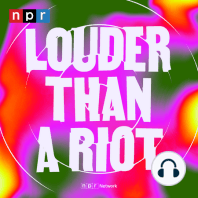52 min listen

If you see something, say nothing: Kim Osorio v. 'The Source'
If you see something, say nothing: Kim Osorio v. 'The Source'
ratings:
Length:
60 minutes
Released:
Apr 27, 2023
Format:
Podcast episode
Description
In 2006, Kim Osorio, the editor-in-chief of The Source, sued the magazine and its owners for workplace sexual harassment. Nearly two decades later, hip-hop still has not had a true reckoning around sexual misconduct. In this episode, former Source writers take us behind the scenes at the hip-hop bible and the environment that led to the suit. And activist Tarana Burke, creator of "Me Too," reflects on how this case could have put hip-hop ahead of the curve on reckoning with misogynoir.
Released:
Apr 27, 2023
Format:
Podcast episode
Titles in the series (28)
The Conspiracy Against Hip-Hop: Why are hip-hop and mass incarceration so entangled in America? How did they become that way? A mysterious letter sends us back in time to find out. by Louder Than A Riot